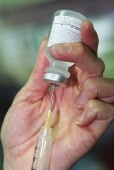
MONDAY, June 3 (HealthDay News) — Parents who opt out of vaccinating their children are putting their own kids and others around them at risk of serious illness, finds a study conducted in New York.
Almost twice as many parents in New York sought religious exemptions from vaccination in 2011 compared to 12 years earlier, and cases of whooping cough (pertussis) increased simultaneously, the study found.
“The reason for the rising rates for religious exemptions is unknown. Our preliminary results suggest that it’s not for religious reasons alone,” said study senior author Dr. Jana Shaw, an assistant professor of pediatrics at SUNY Upstate Medical University in Syracuse.
Counties with exemption rates of 1 percent or more experienced higher rates of whooping cough in both unvaccinated and vaccinated children — 33 cases per 100,000 children on average compared to 20 cases per 100,000 in counties with lower exemption rates, the study found.
Statewide, the rate of exemptions grew from 0.23 percent to 0.45 percent between 2000 and 2011, Shaw said, noting that the total number is still low. “But some counties are much higher — up to 5.58 percent,” said Shaw, whose results were released online June 3 in the journal Pediatrics.
New York State requires that children attending its schools be immunized for diphtheria, tetanus, whooping cough, polio, hepatitis B, measles, mumps, rubella and varicella (chickenpox), according to background information included in the study.
The state’s education department allows children to attend schools without the required vaccinations if the family has religious reasons for not doing so. Implementation of the exemptions is left up to the principals in each school, Shaw said.
Whooping cough is a highly contagious bacterial disease that attacks the respiratory system. In 2012, the United States had the most whooping cough cases since 1959 — 41,000 illnesses and 18 deaths, mostly in infants, according to the U.S. Centers for Disease Control and Prevention.
One reason for the resurgence of whooping cough is that the newer vaccine — which causes far fewer side effects than the old vaccine — doesn’t work for as long as the older vaccine. Because of this, it’s crucial that children receive their vaccines and boosters on time. Delaying vaccination increases the risk of whooping cough.
In New York, the average annual rates of whooping cough ranged from eight cases per 100,000 children to 124 cases per 100,000 children, depending on the county, the study found.
But unvaccinated children were 14 times more likely to develop whooping cough than vaccinated children — 302 cases per 100,000 unvaccinated youngsters compared to 22 per 100,000 who had been vaccinated, the study found.
The study’s authors suspect not all of the exemptions are for purely religious reasons, but that parents who have strong beliefs about vaccines or concerns about vaccine safety may use the religious exemption so they don’t have to have their children vaccinated.
“It’s troubling from an ethical standpoint,” Shaw said. “If you have gotten an exemption for your child, not only are they at higher risk of [whooping cough], but you’re putting other children at risk — even those who have been vaccinated.”
Shaw said it’s a sensitive issue, and exemptions should not be granted for personal reasons. “But principals are not experts on religion, so they may not be comfortable challenging the parents,” she said.
Dr. Kenneth Bromberg, chairman of pediatrics at the Brooklyn Hospital Center in New York City, said the findings raise an important question. “We have to decide whether we think as a society that it’s OK to opt out of immunization because of religion,” he said. “People may be using the religious exemption as a surrogate for their anxieties about vaccination.”
A second study in the same journal issue found that 39 percent of babies whose doctors didn’t suggest giving necessary vaccinations didn’t get their immunization on time.
“The longer a parent delays a vaccination, the more days of undervaccination you’ve got in the population,” Bromberg said. “That means more risk for that kid and for others.”
More information
Learn more about vaccination laws and exemptions from the U.S. Centers for Disease Control and Prevention.

